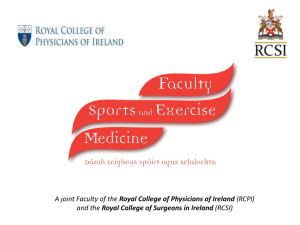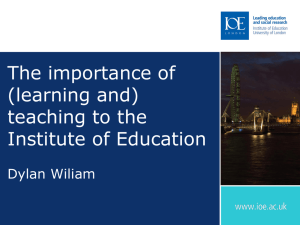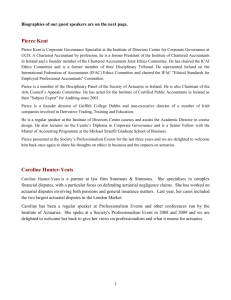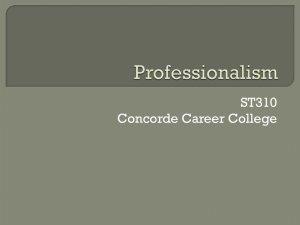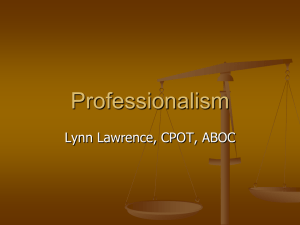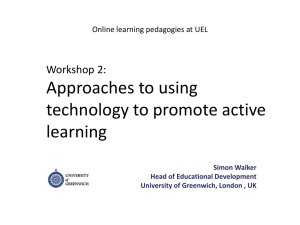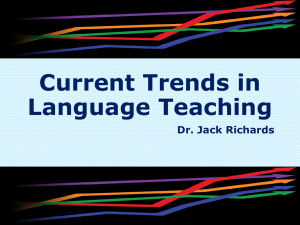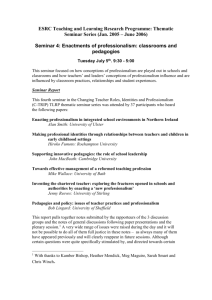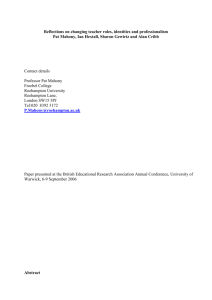Seminar 4 Abstracts - Teaching and Learning Research Programme
advertisement
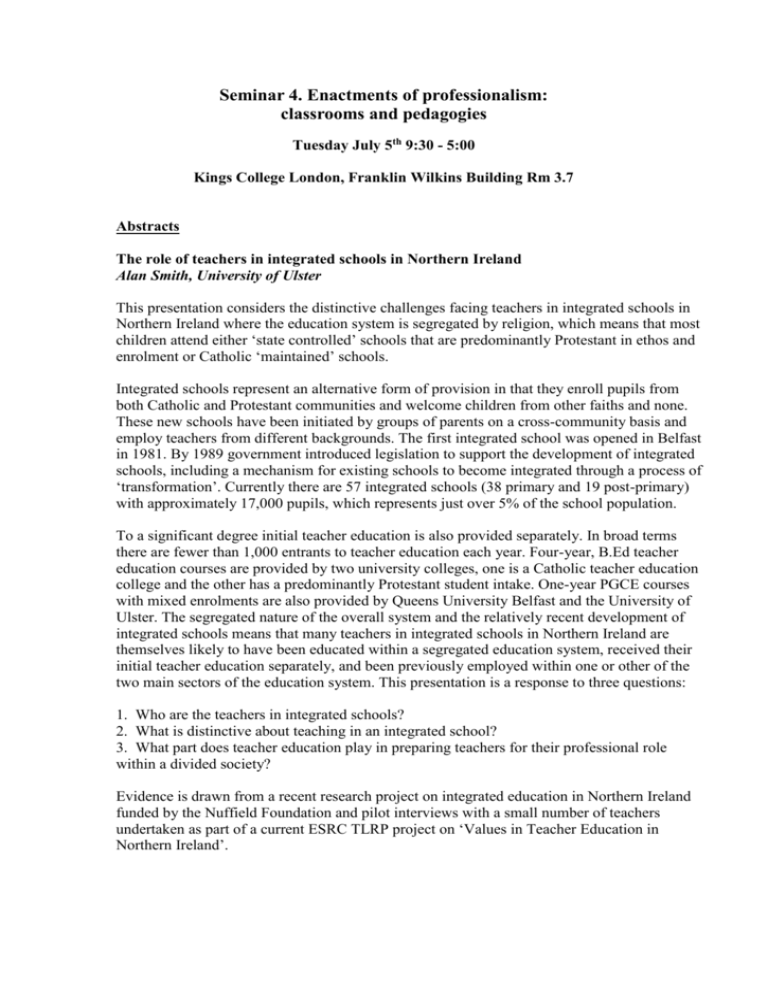
Seminar 4. Enactments of professionalism: classrooms and pedagogies Tuesday July 5th 9:30 - 5:00 Kings College London, Franklin Wilkins Building Rm 3.7 Abstracts The role of teachers in integrated schools in Northern Ireland Alan Smith, University of Ulster This presentation considers the distinctive challenges facing teachers in integrated schools in Northern Ireland where the education system is segregated by religion, which means that most children attend either ‘state controlled’ schools that are predominantly Protestant in ethos and enrolment or Catholic ‘maintained’ schools. Integrated schools represent an alternative form of provision in that they enroll pupils from both Catholic and Protestant communities and welcome children from other faiths and none. These new schools have been initiated by groups of parents on a cross-community basis and employ teachers from different backgrounds. The first integrated school was opened in Belfast in 1981. By 1989 government introduced legislation to support the development of integrated schools, including a mechanism for existing schools to become integrated through a process of ‘transformation’. Currently there are 57 integrated schools (38 primary and 19 post-primary) with approximately 17,000 pupils, which represents just over 5% of the school population. To a significant degree initial teacher education is also provided separately. In broad terms there are fewer than 1,000 entrants to teacher education each year. Four-year, B.Ed teacher education courses are provided by two university colleges, one is a Catholic teacher education college and the other has a predominantly Protestant student intake. One-year PGCE courses with mixed enrolments are also provided by Queens University Belfast and the University of Ulster. The segregated nature of the overall system and the relatively recent development of integrated schools means that many teachers in integrated schools in Northern Ireland are themselves likely to have been educated within a segregated education system, received their initial teacher education separately, and been previously employed within one or other of the two main sectors of the education system. This presentation is a response to three questions: 1. Who are the teachers in integrated schools? 2. What is distinctive about teaching in an integrated school? 3. What part does teacher education play in preparing teachers for their professional role within a divided society? Evidence is drawn from a recent research project on integrated education in Northern Ireland funded by the Nuffield Foundation and pilot interviews with a small number of teachers undertaken as part of a current ESRC TLRP project on ‘Values in Teacher Education in Northern Ireland’. Making professional identities through relationships between teachers and children in early childhood settings Hiroko Fumoto, Roehampton University This paper discusses the ways teachers’ experiences of relating to young children provide the context of making their professional identities. It draws on two studies that describe the nature of teacher-child relationships in early childhood settings: (1) a short-term longitudinal study of the predictive values of particular aspects of children’s development on teachers’ perceptions of their relationships with them; and (2) an interview study of teachers’ experiences of relating to young children in early childhood settings. Ten nursery school teachers and their relationships with 143 children (M=3 years 8 months) were assessed by means of the StudentTeacher Relationship Scale (Pianta, 1996) and the children’s developmental progress was assessed in terms of the Boxall Profile (Bennathan and Boxall, 1998). Both studies draw on developmental systems theory (Ford and Lerner, 1992) which allows us to conceptualise teacher-child relationships as a developmental context for both children and the teachers. The findings suggest the ways in which teachers interpret children’s involvement in activities have a significant influence on the way they relate to these children. This paper concludes by considering the implications for teachers’ professional development, which in turn is closely associated with the making of their professional identities. Supporting innovative pedagogies: the role of school leadership John MacBeath, Cambridge University This paper draws on data from the ESRC Learning to Learn Project and from a study of distributed leadership conducted on behalf of the National College of School Leadership. Through the analysis of headteacher and teacher interviews we are afforded a picture of the role school leadership plays in supporting and embedding innovative practice. What does and doesn’t deserve support is dependent on the values that leaders attribute to differing practices, on what constitutes innovative practice and the authority it carries with it. Hence decisions are made not solely on the merits of any innovation but always with an eye to the mandate, or warrant, which accompanies it. How those decisions are made and how support is framed by school leaders is the subject of this paper. Towards Effective Management of a Reformed Teaching Profession Mike Wallace, University of Bath A normative argument will be developed advocating a more temperate approach towards leading and managing the teaching profession - and so more temperate policy-making and implementation - than has prevailed in the UK for decades. This argument will be framed by an ironic perspective applied to professional and managerial practice and change. It offers one way to harness the mutually informing potential of ideas and evidence derived from partially incompatible intellectual projects: producing ‘knowledge-for-understanding’ through organisation theory, focusing on professional learning to develop ‘knowledge-for-action’, and sociological studies of teachers’ workplace leaning towards ‘knowledge-for-critical evaluation’. This stance points to unintended ironies of managerialism - excessive leadership and management - which threaten to become self-serving rather than serving education, inhibit professional practice to make reforms work in contingent circumstances, and stimulate their covert mediation. But the stance draws on professional learning and organisation theory in suggesting how leaders, managers and policy-makers could do better. Once the irony is accepted that tightly controlled transformational reform is unrealistic, a more promising alternative becomes promoting incremental improvement within broad consensual limits of acceptable practice. Expanding the scope for teachers to make professional judgements is a more realistic approach to fostering educational improvement in diverse contexts. Inventing the Chartered Teacher: exploring the fractures opened in schools and authorities by enacting a ‘new professionalism’ Jenny Reeves, University of Stirling The McCrone agreement, A Teaching Profession for the 21st Century (2001) introduced new pay and working conditions for teachers in Scotland. As part of re-structuring the profession, it created the status of chartered teacher to enable good classroom teachers to achieve a salary equivalent to that of a middle manager without having to move into a management post. Chartered teacher status is gained through qualification against an occupational standard (SED, 2002) either by following an approved postgraduate masters degree or through accreditation of prior learning with the General Teaching Council for Scotland. This paper looks at some of the conceptual and practical difficulties faced by teachers and their tutors on one of the accredited masters programmes as they try to enact what being a Chartered Teacher means. Pedagogies and Policy: Issues of Teacher Practices and Professionalism Bob Lingard, University of Sheffield This paper argues that pedagogies are central to teacher identities and professionalism, but have remained either silent in such constructions in comparison with curriculum/subject identification and assessment practices or have been technicised in deprofessionalising ways by policy. Drawing on a large Queensland research study, a model of productive pedagogies is developed, which, it is argued, can make a difference in terms of social justice goals of schooling. The evidence, however, demonstrates how teaching, in the research sample at least, has become a caring profession, rather than one which also constitutes intellectual demands as central to the social justice purposes of schooling. The paper argues that aspects of the three message systems of schooling, namely curriculum, pedagogy and assessment, need to be involved in the constitution of a progressive professionalism for teachers within the contemporary ‘totally pedagogised society’. Using evidence from Australia and England, the paper also suggests that there is a danger when pedagogies become the explicit or even implicit focus of systemic policies, even those based on research evidence, particularly when linked to the new accountabilities associated with new public management. Systemic trust of teachers must be a central element of any effective educational system, which recognises the centrality of teachers to good schooling and the gap between the logics of practice which inform centralised policy development and those which inform classroom practices.
